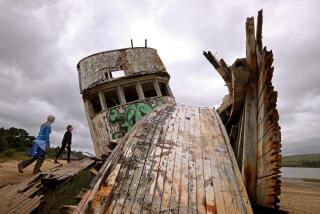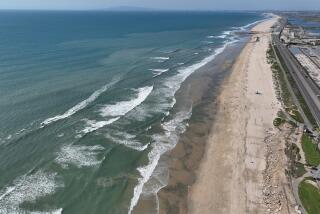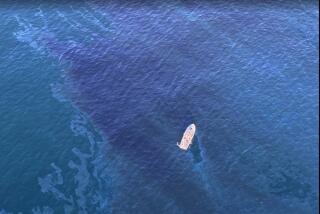Oily Boats Made Shipshape
- Share via
Some fishing boats sported a tell-tale black oil “mustache” across the bow.
Thick globs of the stuff had splashed across decks and covered net racks and other equipment in a glutinous sheen. And the crafts’ crews, their clothes daubed with oily residue, waited in weary resignation as people attired in white decontamination suits sprayed, wiped and washed the sticky mess away.
Four days after heading to waters off the Santa Barbara coastline to help contain and clean up an oil spill from a leaking undersea pipeline, a flotilla of 16 fishing vessels late Thursday began straggling back into the Port of Hueneme for decontamination.
“I just want to get out of here,” an exhausted John Colgate said Friday, as the Santa Barbara-based commercial fisherman watched his 40-foot vessel Maalaeabeing hoisted out of the water onto the dock so crews could clean the hull. “We got up there and towed [booms] until there wasn’t any oil left.”
The floating booms pulled by boats for up to 20 hours a day contained and concentrated the oil, enabling it to be skimmed from the surface.
Colgate and his fellow vessel owners are members of Fisherman’s Oil Response Team. The group boasts 180 boats and 320 commercial fishermen from Morro Bay to Port Hueneme who mobilize to protect their fishing grounds in the event of a major oil spill. The first boats were deployed within 30 minutes of the Monday morning spill.
About 375 barrels of oil and water were recovered from a 10-mile square area of ocean and 3-mile stretch of beach, said Rob Bensha spokesman for Torch Operating Co., the Houston-based firm that owns the pipeline. The spill killed about 65 birds.
The spill off the coast of Vandenberg Air Force Base was the fifth the Ventura Harbor-based team has responded to since forming in 1990, said director Michele Walker.
Terrell Cryer, a 47-year-old urchin fisherman whose 32-foot-long boat Kathryn Anne is based at Oxnard’s Channel Islands Harbor, found his first experience of helping contain an oil spill exciting and gratifying.
“When you saw these monster globs of tar on the water, it was nice to get it cleaned up,” he said. “People think fisherman are not concerned about the environment, but I think we’re more concerned than anybody.”
For their trouble, boat owners were paid $43 a vessel foot per 24 hours, an amount roughly equivalent to a good day’s fishing. And their craft also got a thorough, and in some cases much-needed, meticulous hand-scouring.
“They provided us a good service and helped us a lot,” said Kevin Wright, Torch’s demobilization manager for the spill. “If it happens they get a free boat cleaning, so be it.”
More to Read
Sign up for Essential California
The most important California stories and recommendations in your inbox every morning.
You may occasionally receive promotional content from the Los Angeles Times.













